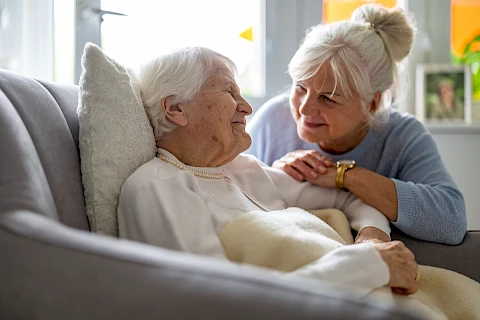
Are you ready for winter? As a family caregiver, you need to be aware of how changing weather can impact seniors' health. Seniors face season-specific challenges when the weather changes. Knowing how to deal with them can make a big difference in your loved one's well-being.
How Weather Affects Seniors' Health
Seasonal affective disorder (SAD) is a type of depression that occurs at certain times of the year, usually in the winter. Symptoms include feeling tired, sad, and uninterested in daily activities. Changes in weather, like shorter days and less sunlight, can trigger SAD in seniors. Learn to recognize these symptoms and know how to address them. Many seniors suffer from arthritis, which causes joint pain and stiffness. Weather changes, especially cold and damp conditions, can make these symptoms worse. Seniors with arthritis might feel their joints aching more during colder months. Understanding these triggers can help you manage arthritis pain effectively. Weather changes can also affect respiratory health. Conditions like asthma and chronic obstructive pulmonary disease (COPD) can worsen due to changes in temperature and humidity. Seniors can experience increased respiratory issues, such as shortness of breath and wheezing.
Strategies for Managing SAD
Light therapy can help reduce symptoms of SAD. This involves exposure to bright light that mimics natural sunlight. You can buy a light therapy box that emits this bright light and have the senior sit near it for about 30 minutes each day. Doing this can improve their mood and energy levels, especially during the gloomy winter months. Keeping a consistent daily routine can help combat SAD. Make sure to include activities that the senior enjoys, such as reading, puzzles, or light exercise. Regular mealtimes and sleep schedules also contribute to a sense of normalcy and can improve their mood. Social interaction is key to good mental health. Encourage seniors to stay connected with family and friends. This can be through phone calls, video chats, or safe in-person visits. Joining community groups or participating in hobbies can also provide much-needed social interaction.
Managing Arthritis Pain in Changing Weather
Regular exercise is important for managing arthritis. Low-impact exercises such as walking, swimming, or yoga can keep joints flexible and reduce pain. Encourage the senior to stay active, even if it's just a short walk around the neighborhood. Keeping joints warm can help reduce arthritis pain. Make sure the senior wears warm clothing and uses blankets when it's cold. Heat therapy, like using a heating pad or taking warm baths, can also provide relief from pain and stiffness. Seniors should follow their prescribed medication regimen to manage arthritis pain. Regular consultation with healthcare providers can help keep the pain under control. If the pain becomes too much, don't hesitate to reach out to their doctor for additional advice. Also, be sure to seek out medical advice before the senior tries new exercises.
Addressing Respiratory Issues
Maintaining good indoor air quality is necessary for respiratory health. Use air purifiers to keep the air clean and free from pollutants. Make sure to regularly change air filters in heating and cooling systems. Keeping the home free from dust and mold will also help. Drinking enough fluids is a requirement for respiratory health. Encourage seniors to drink water throughout the day. Staying hydrated helps keep the respiratory tract moist and can reduce the risk of infections. Keep an eye on weather forecasts. If you know a cold front or a period of high humidity is coming, plan accordingly. Adjusting activities based on weather conditions can help manage respiratory issues. For example, staying indoors on very cold or humid days can prevent flare-ups.
Be Comfortable This Winter With Senior Helpers
If you need professional caregiving support in Louisville, LaGrange, Crestwood, or Prospect, or in the greater Jefferson County area, contact us at Senior Helpers Louisville. We're here to help family caregivers provide the best care for their senior loved ones.